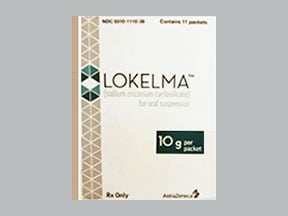
Lokelma Coupons & Savings Card – Discount Prices from $847.77
My prescription
Edit
10GM, Lokelma (30 Packets)
Select pharmacy

CVS
$856.05
COUPON PRICE
Albertsons
$847.77
COUPON PRICE
Walmart
$860.71
COUPON PRICE
Walgreens
$861.45
COUPON PRICELokelma savings card
Show this card to your pharmacist
Albertsons
$847.77
BIN
ID
PCN
GRP
015995
LHKPX272661
GDC
DR33
Powered by
Related potassium binders prescriptions
More prescriptions for hyperkalemia
Related potassium binders prescriptions
More prescriptions for hyperkalemia
Price history for Lokelma
30 Packets, 10GM
Average retail price for Lokelma
Average SaveHealth price for Lokelma
Our price history data is based on aggregated prescription data collected from participating pharmacies in America. Our prescription data updates daily to reflect the latest price changes. If you notice a missing data point, it means there wasn't sufficient data available to generate a monetary value for that date.
*Retail prices are based on pharmacy claims data, and may not be accurate when we don't have enough claims.
Lokelma dosage forms
Dosage Quantity Price from Per unit 5GM 1 Packet $28.47 $28.47 5GM 11 Packets $313.88 $28.54 5GM 30 Packets $856.05 $28.54 10GM 30 Packets $856.05 $28.54 10GM 1 Packet $28.47 $28.47 10GM 3 Packets $85.60 $28.53 10GM 11 Packets $313.88 $28.54
| Dosage | Quantity | Price from | Per unit |
|---|---|---|---|
| 5GM | 1 Packet | $28.47 | $28.47 |
| 5GM | 11 Packets | $313.88 | $28.54 |
| 5GM | 30 Packets | $856.05 | $28.54 |
| 10GM | 30 Packets | $856.05 | $28.54 |
| 10GM | 1 Packet | $28.47 | $28.47 |
| 10GM | 3 Packets | $85.60 | $28.53 |
| 10GM | 11 Packets | $313.88 | $28.54 |
What is Lokelma used for?
Lokelma is used for the treatment of hyperkalemia, which is a condition characterized by elevated levels of potassium in the blood.
Is lokelma similar to Kayexalate?
Lokelma and Kayexalate are both medications used to treat hyperkalemia, which is a condition characterized by elevated levels of potassium in the blood. However, they differ in their composition and mechanism of action. Lokelma (sodium zirconium cyclosilicate) works by exchanging sodium ions for potassium ions in the gastrointestinal tract, thereby reducing potassium levels. Kayexalate (sodium polystyrene sulfonate) also exchanges sodium for potassium but has a different chemical structure. Both medications aim to lower potassium levels, but they may have different side effect profiles and dosing regimens. It is important for patients to follow their healthcare provider's recommendations when using these medications.
Is lokelma hard on the kidneys?
Lokelma (sodium zirconium cyclosilicate) is generally considered safe for the kidneys. It is used to treat hyperkalemia, a condition characterized by high potassium levels in the blood, which can be harmful to the kidneys if left untreated. Lokelma works by binding potassium in the gastrointestinal tract, thereby reducing its levels in the blood. However, as with any medication, it is important for patients to use it under the guidance of a healthcare provider, who will monitor kidney function and overall health to ensure its safe use.
Can Lokelma lower potassium too much?
Yes, Lokelma (sodium zirconium cyclosilicate) can potentially lower potassium levels too much, leading to hypokalemia. It is important for patients to have their potassium levels monitored regularly while taking Lokelma to ensure they remain within a safe range. If there are any concerns about symptoms of low potassium, such as muscle weakness or irregular heartbeats, it is advisable to contact a healthcare provider.
Does lokelma work if you don't poop?
Lokelma (sodium zirconium cyclosilicate) is used to treat hyperkalemia by binding potassium in the gastrointestinal tract. It is effective regardless of bowel movement frequency, as it works by exchanging sodium for potassium in the intestines. However, if there are concerns about constipation or bowel movement frequency, it is important to consult a healthcare provider for appropriate management.
